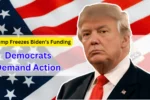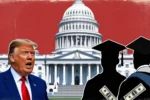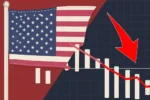Amid the usual excitement of the J.P. Morgan Healthcare Conference, a dark cloud lingered over the proceedings this year, marked by heightened security and emotional undercurrents stemming from the recent assassination of UnitedHealthcare CEO Brian Thompson. The first day of the conference saw a demonstration across the street from the Westin St. Francis Hotel, drawing attention to the deep dissatisfaction many Americans feel toward the healthcare system.
The protesters, including musicians, healthcare workers, and teachers, were there to voice their frustration over systemic issues in healthcare, particularly the profit-driven approach that they argue harms patients. Steve Zeltzer, a labor journalist and organizer, addressed the crowd while holding a sign that read “No more Deny, Delay, Depose,” referencing bullet casings found near Thompson’s body when he was shot and killed in New York City last month. While the protest itself remained largely peaceful, it was clear that the event was part of a broader call for systemic change.
One protester, however, took his anger further, crossing the street and shouting expletives and slogans at attendees entering the conference, spitting as he spoke. His actions drew attention from both conference-goers and security personnel, and even though the protests were outside the conference, the implications of Thompson’s death could not be ignored within the venue. The shooting of the UnitedHealthcare CEO had cast a long shadow over this year’s event, reminding those attending that behind the deals, the innovations, and the investments, there is significant public anger about the state of healthcare in the U.S.
The J.P. Morgan Healthcare Conference is renowned as a major hub for healthcare industry leaders, where new medical technologies, treatments, and collaborations are often announced. However, the effects of the shooting were palpable, and even the physical environment of the conference was altered in response. To ensure safety, the San Francisco Police Department provided a dedicated police detail, and JPMorgan increased private security personnel. This bolstered security was a clear response to the risks now associated with the high-profile gathering, especially considering the significant impact of Thompson’s death on the healthcare leadership community.
“The security measures here are a reflection of the reality many of us are now facing,” said Terry Shaw, CEO of AdventHealth, a nonprofit health system. He noted that many health executives, including himself, have adjusted their routines and made personal security modifications in response to the shooting. For Shaw and his peers, the tragedy has highlighted the tangible risks and the growing tension between the healthcare industry and the American public.
The incident also had a notable effect on the participation of major health companies at the conference. Several large firms, including Cigna, Humana, and CVS Health, chose not to attend this year, which many attendees saw as a loss for both the companies themselves and the broader industry. Stephen Hahn, CEO of Flagship Pioneering and former FDA commissioner, remarked on the absence of these key players, emphasizing that without them, there were fewer opportunities for collaboration and commercial engagement. “It’s sad for me that that’s occurred, and the reason it’s occurred,” he said.
Despite these challenges, discussions at the conference often veered toward the systemic issues in the U.S. healthcare system. David Earp, CEO of Circle Pharma, acknowledged the inefficiencies plaguing the system, expressing a desire to move past blame and toward solutions. He noted that the public frustration, while understandable, must be channeled into constructive conversations that aim to reform healthcare without demonizing individuals or companies.
The complexity of healthcare, as discussed by Dan Morissette, CFO of CommonSpirit Health, was a common theme. Morissette stressed the need for the public to regain trust in the system, which includes pharmaceutical companies, insurers, healthcare providers, and medical device manufacturers. Many executives, including Shaw from AdventHealth, also acknowledged the public’s frustration, but some suggested that the anger should be more accurately directed at the employers who provide healthcare coverage, rather than at the executives within the system.
The heightened security measures and the ongoing debate about the state of U.S. healthcare seemed to underscore an unsettling reality—the divide between the industry’s high-level discussions and the frustrations of everyday Americans. As Edwin Stone, CEO of Cellular Origins, noted, it was “unsettling” to witness armed security on the grounds of what is normally a gathering of healthcare’s brightest minds. Yet, the focus remained on innovation and investment, as deals and announcements continued at the conference, albeit under a cloud of uncertainty.
In the end, the J.P. Morgan Healthcare Conference served as a reflection of a broader societal tension. The pursuit of progress in medicine and healthcare technology continued inside the conference halls, but the shadow of Thompson’s death, the protests, and the ongoing public frustration with the U.S. healthcare system were constant reminders of the unresolved issues that remain outside. As the healthcare industry grapples with its role in addressing these challenges, the tragic events surrounding Thompson may serve as both a catalyst for change and a painful marker of the deep-seated anger that still lingers in the American public.



